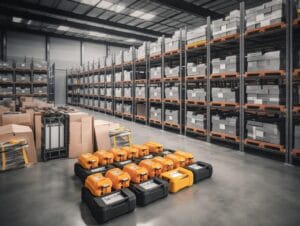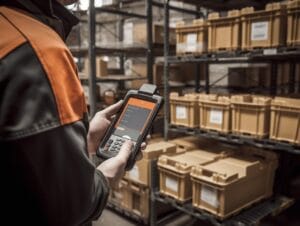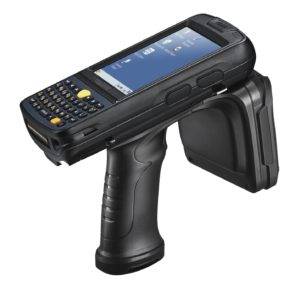RFID (Radio-Frequency Identification) Technology: RFID technology uses electromagnetic fields to automatically identify and track tags attached to objects. In the oil and gas industry, RFID tags are attached to equipment, tools, and inventory items to monitor their location and usage in real-time. This technology enhances asset management, improves inventory accuracy, and reduces loss or theft. RFID tags can store detailed information such as maintenance history, usage data, and compliance records, enabling efficient tracking and management of assets across various stages of operations, from supply chain management to field deployment.
IoT (Internet of Things) Technology: IoT technology refers to the interconnection of physical devices through the internet, enabling them to collect and exchange data. In the oil and gas industry, IoT devices such as sensors, smart meters, and connected machinery collect real-time data on equipment performance, environmental conditions, and operational metrics. This data is transmitted to centralized systems for analysis, allowing for predictive maintenance, remote monitoring, and enhanced decision-making. IoT technology helps optimize production processes, improve safety and compliance, reduce operational costs, and increase overall efficiency by providing actionable insights and automation capabilities.
How RFID Can Help in the Oil and Gas Business

The oil and gas industry is constantly seeking new technologies to enhance efficiencies and meet management demands to reduce budgets, labor, and operational costs while boosting production. This sector also faces heightened risks in health, safety, and the environment, particularly in unconventional plays and new geographical locations. Implementing robust policies and practices for compliance and risk management is more critical than ever. RFID (Radio-Frequency Identification) technology can significantly improve operations and efficiency in this challenging environment.
Asset Tracking

RFID tags can be attached to equipment, tools, and other assets, allowing real-time tracking of their movements and locations. This reduces the loss or theft of valuable equipment and minimizes downtime. By knowing exactly where each asset is, companies can ensure that equipment is always available when needed, preventing costly delays and enhancing operational efficiency.
Supply Chain Management
RFID technology streamlines the tracking of goods from suppliers to warehouses and finally to oil rigs. It simplifies monitoring material flow, managing inventory levels, and ensuring the availability of the right supplies. This visibility allows for better planning and reduces the chances of stockouts or overstocking, ultimately saving costs and improving efficiency.
Safety and Compliance

In an industry where safety is paramount, RFID can help monitor and enforce safety regulations and ensure compliance with industry standards. RFID tags can track the maintenance and inspection history of equipment, ensuring that all machinery is in proper working condition. Additionally, RFID can monitor the training and certification of employees, ensuring that only qualified personnel operate specific equipment, thereby reducing the risk of accidents.
Workforce Management
RFID technology can track personnel movements, making it easier to manage schedules, monitor activities, and ensure safety compliance. This tracking capability ensures that employees are where they need to be and that safety protocols are adhered to, significantly enhancing overall workforce management.
Environmental Monitoring

RFID can help prevent environmental incidents by monitoring pipelines and tanks for leaks. Sensors equipped with RFID can detect potential problems early, allowing for prompt intervention before issues escalate. This proactive approach not only protects the environment but also prevents costly clean-ups and fines.
Lifecycle Management of Tools and Equipment
RFID tags embedded in tools and equipment provide unique IDs that survive the lifecycle of the items. This technology enables total lifecycle management, from tracking “born-on” dates and certification dates to monitoring days in use. This detailed tracking ensures that all equipment is properly maintained and replaced when necessary, enhancing operational efficiency and safety.
Advantages Over Barcodes
While barcodes have traditionally been used for tracking, RFID offers significant advantages. RFID data acquisition is ten times faster than barcodes, and RFID tags are more durable, especially in harsh oil and gas environments. Unlike barcodes, which can become unreadable after a single use, RFID tags can endure and provide accurate data throughout their lifecycle.
The RFID Solution

RFID’s automated bulk data capture and non-line-of-sight technology provide real-time visibility of assets, locations, and employees with minimal human effort. This automation reduces time spent on paperwork and manual data entry, improving accuracy and allowing highly trained employees to focus on more critical tasks. RFID’s read-write capability also streamlines record-keeping, enabling access to updated data at the point of business activity.
Increased Employee Efficiency
RFID technology automates many processes, increasing employee efficiency. By reducing the need for manual data entry and tracking, employees can focus on more strategic tasks, improving overall productivity.
Enhanced Supply Chain Automation
RFID increases the automation of product movement and supply, ensuring that materials are efficiently tracked and managed throughout the supply chain. This automation helps reduce errors and delays, ensuring that operations run smoothly.
Optimal Asset Utilization
By providing real-time visibility into asset locations and conditions, RFID ensures that all assets are optimally used. This reduces unnecessary purchases and ensures that equipment is maintained and utilized to its fullest potential.
Reduced Inventory Carrying Costs
With accurate real-time data on inventory levels, RFID helps reduce carrying costs by preventing overstocking and ensuring timely replenishment of supplies. This efficiency reduces storage costs and minimizes waste.
Protection Against Unplanned Downtime
RFID technology helps prevent unplanned downtime by ensuring that equipment is regularly maintained and replaced before failures occur. This proactive approach keeps operations running smoothly and prevents costly interruptions.
Ensuring Cost-Effective Regulatory Compliance
RFID ensures that all regulatory compliance requirements are met cost-effectively. By tracking equipment maintenance, employee certifications, and safety protocols, RFID helps companies stay compliant with industry regulations without excessive manual effort.
Improving Employee Safety
RFID enhances employee safety by ensuring that only trained and certified personnel operate equipment and by tracking employee locations to ensure adherence to safety protocols. This monitoring helps prevent accidents and ensures a safe working environment.
RFID, Location-Based Data Services, and Cloud Computing
Combining RFID with location-based data services and cloud computing offers significant benefits. For example, a materials manager can collect data from handheld devices, link it to RFID tags on components, and store it in the cloud. This integration allows quick retrieval of data, enabling rapid response to issues like manufacturer recalls and enhancing overall asset management.
Pipeline Asset Management
RFID, combined with GPS coordinates and cloud data, provides comprehensive asset management for pipelines. Operators can track maintenance history, monitor pipeline integrity, and ensure compliance with regulations. This detailed tracking reduces downtime and enhances the efficiency and safety of pipeline operations.
Enhanced Inventory Management
RFID improves inventory management by providing real-time data on stock levels and locations. This visibility ensures efficient deployment of materials and prevents stockouts or overstocking. Accurate inventory data helps management make informed decisions, improving overall operational efficiency.
Real-World Applications
In the oil and gas industry’s large, dispersed environments, RFID automates tracking of consumables, safety equipment, vehicles, and more. Mobile or handheld RFID readers identify assets upon arrival, updating inventory systems and ensuring real-time visibility. This automation streamlines operations, reduces errors, and enhances efficiency.
Dynamic Data on RFID Tags
RFID tags can store dynamic data, such as usage history, enabling better decision-making. For example, drilling engineers can access a pipe’s wear-and-tear history, helping predict when to retire it and avoid costly failures. This detailed data improves asset management and operational efficiency.
Conclusion
RFID technology offers numerous benefits to the oil and gas industry, including improved visibility, enhanced safety, and increased efficiency. By automating asset tracking, supply chain management, safety compliance, and more, RFID transforms traditional processes into more efficient, electronic systems. As the industry continues to adopt RFID and integrate it with advanced data services, the potential for enhanced operations and safety will only grow.
FAQs
1. How does RFID differ from barcodes in the oil and gas industry?
RFID provides faster data acquisition, greater durability, and the ability to read and write data, unlike barcodes which are slower and can become unreadable after use.
2. How does RFID improve safety in the oil and gas industry?
RFID tracks equipment maintenance, employee certifications, and real-time locations, ensuring safety protocols are followed and enabling quick responses to emergencies.
3. What are the cost benefits of implementing RFID in the oil and gas industry?
RFID reduces operational costs by improving asset tracking, reducing downtime, optimizing inventory levels, and automating manual processes, leading to significant long-term savings.
4. Can RFID be used for environmental monitoring in the oil and gas industry?
Yes, RFID can monitor pipelines and tanks for leaks, helping prevent environmental incidents and ensuring timely intervention to minimize damage.
5. How does RFID integration with cloud computing benefit the oil and gas industry?
RFID integration with cloud computing allows real-time data access, enhances asset management, improves decision-making, and ensures efficient operations through detailed tracking and monitoring.





